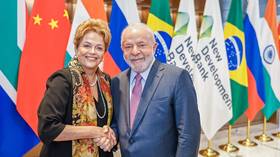India clarifies position on BRICS expansion
The claim about having reservations is “simply not true,” a spokesman for the country’s Foreign Ministry has said
India denied on Thursday that it has concerns about the proposed expansion of BRICS, a claim that was made earlier this week by Reuters. Brazil has also come out in support of enlarging the bloc, thus refuting the same report by the news agency, which dubbed it the “main holdout” in the process.
Media claims about India’s purported reservations about the planned growth of BRICS are “baseless speculation,” Foreign Ministry spokesman Arindam Bagchi told journalists on Thursday during a weekly media briefing.
“This is simply not true,” he stressed.
On Wednesday, Reuters claimed, citing anonymous sources in the Brazilian government, that Brazil was the BRICS member with the biggest doubts about expansion, replacing India in that role.
Hours later, however, Brazilian President Luiz Inacio Lula da Silva contradicted the report, voicing public support for bringing new members into BRICS.
“I am of the opinion that as many countries want to enter, if they are in compliance with the rules we are establishing, we will accept the countries’ entrance,” he told journalists.
The bloc of emerging countries currently comprises Brazil, Russia, India, China, and South Africa in its ranks. Dozens of other nations have expressed interest in joining, while 22 have already made formal bids.
Originally consisting of four members, BRICS has only expanded once, when it added South Africa in 2010 without any prior conditions. Member states are currently discussing internally what criteria candidates should meet and how the expansion process would work. BRICS makes decisions by consensus.
South Africa will host a summit of BRICS leaders in Johannesburg in mid-August. Officials from the five nations have expressed hope that by that time the procedure governing expansion will be finalized and ready to be approved.
BRICS members account for some 40% of the world population and about a quarter of the global economy. The bloc positions itself as an alternative to older Western-dominated international institutions.
You can share this story on social media:








Comments are closed.